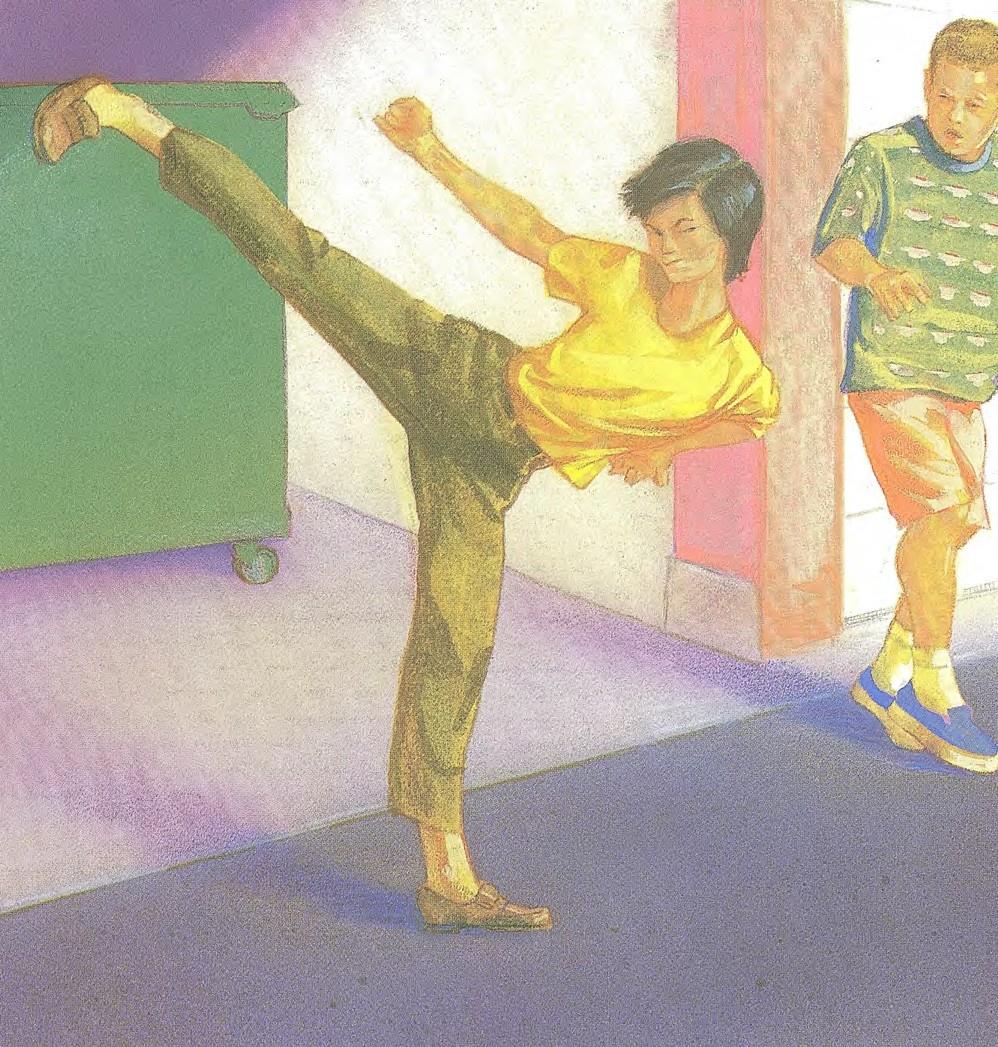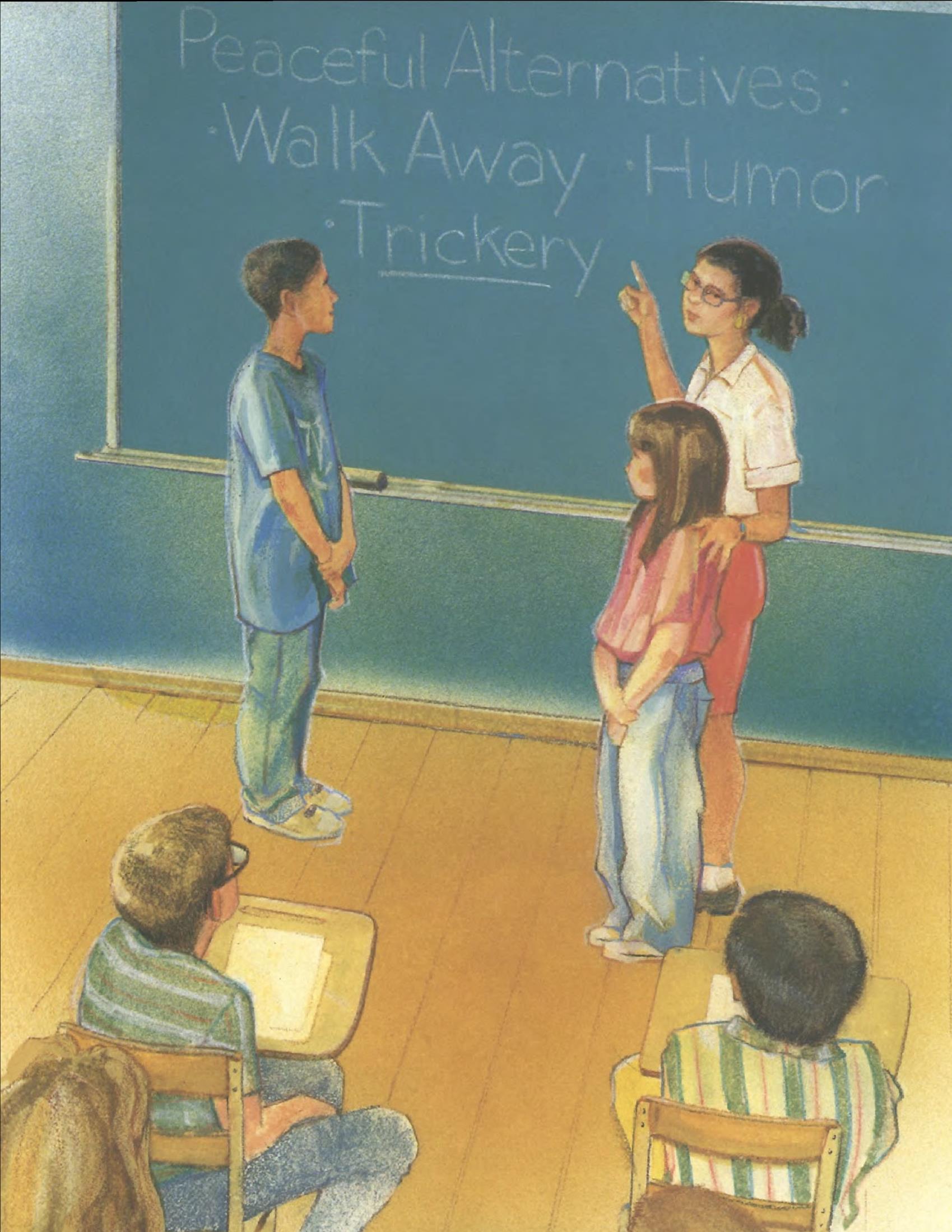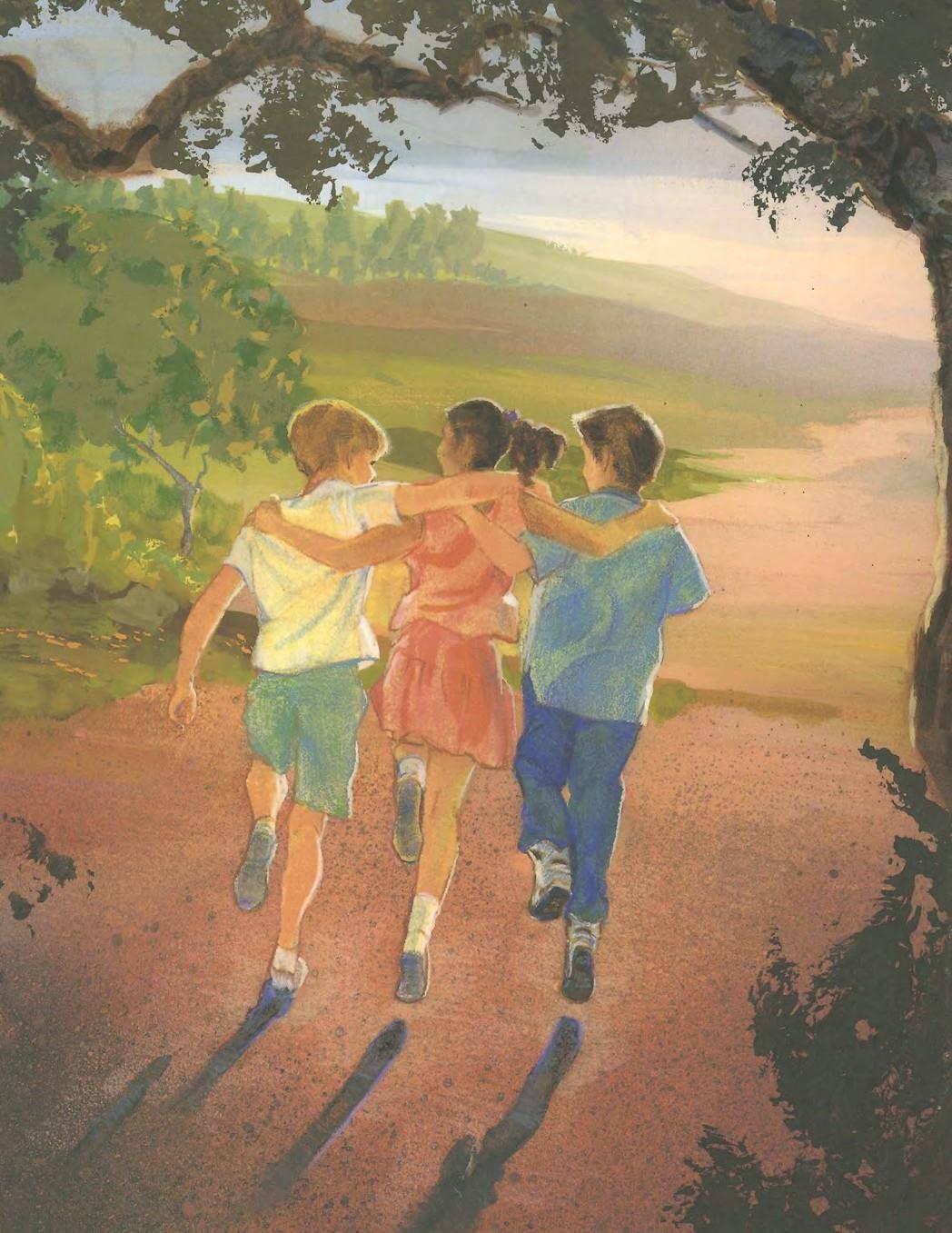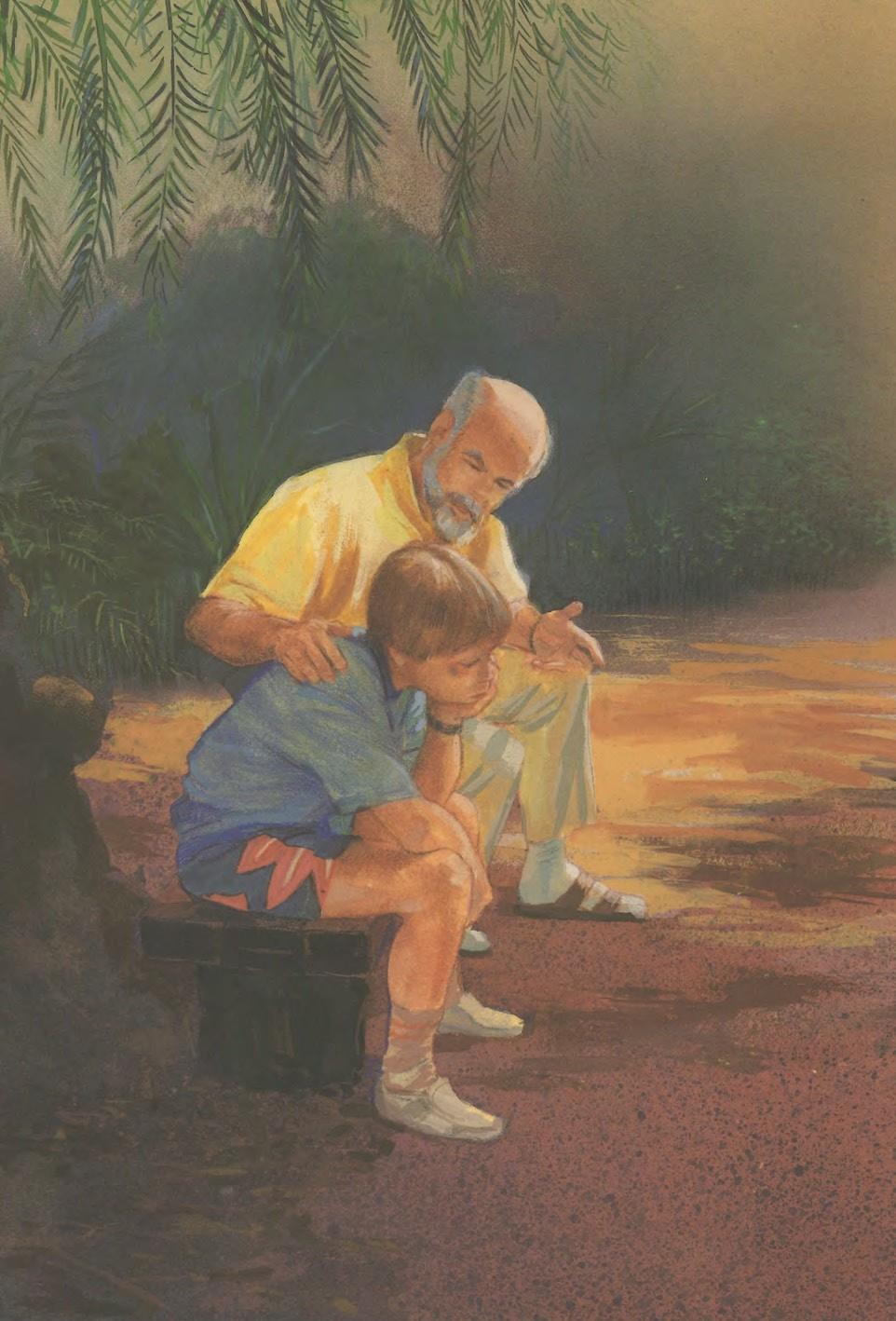Chapter 5
HOW VICTIMS CAN BECOME WINNERS
Do You Mind If I Warm Up?
A Story
A big kid had been picking on a younger boy for months.
The younger boy had tried many ways to get out of fighting, which worked well for a time. But this older tough kid kept on.
Nothing seemed to stop him. Now he was coming down the street again, after the younger boy.
"Hey you, punk. What makes you think you're so hot?" the big kid shouted. The younger boy had nowhere to go since his way was blocked by an apartment building and one long dark alley.
The big kid stood tall and close to the younger and shorter boy. "So I finally got you away from your friends! I'm going to pulverize you, squirt, because you wouldn't give me your lunch money."
The young boy stood calmly and looked the older youth straight in his eyes. "I see that you intend to fight me. I've tried everything to not fight, so I guess now I'm going to have to fight you. But before we start, do you mind if I warm up?"
The bully agreed and the young boy began punching, kicking and striking the air with great speed and power. It was obvious to the bully that this youth knew how to defend himself. Upon seeing the skill of the younger boy, the bully made a lame excuse and a rapid retreat.
56







This is a true story of a famous Karate teacher when he was a young boy. It goes to show that victims can be winners and that there is great strength in the way of nonviolence.
Karate Gives Confidence
One way to learn how to defend yourself and achieve the confidence not to fight is to learn a physical self-defense technique like Karate. Karate teaches you how to block, punch, kick, and strike. It is important for you to keep in mind that Karate teaches these skills to protect you, to help you feel secure in your ability to protect yourself. Knowing these skills keeps you from being afraid when a bully picks on you. Rather than "tense up," you "center" yourself and prepare to protect yourself. You feel so confident knowing these skills that your
"attacker" is often intimidated before you ever use them! You use your mind instead of your fists!
Karate should be learned from a qualified and intelligent Martial Arts teacher.
It cannot be learned properly from a book.
If you decide to learn
physical self-defense techniques,
take the time to find a qualified instructor -
someone who teaches physical skills
and the nonviolent mental skills that go with them.
58
I am a Karate teacher who has taught for over 30 years.
I teach a style of Karate called Take Nami Do. This style of Karate shows a young person like yourself how to have the confidence not to fight. At the same time, it teaches students how to get out of a threatening situation by nonviolent means.
What we do really works! I have taught hundreds of young people how to solve conflict nonviolently.
The important thing to remember is that a student must be taught both physical and mental skills of self-defense. The physical skills give you the confidence that you could handle a fight if it ever came to that. Themental skills offer you ways to resolve a fight before the fighting ever begins.
Using Your Head
You may be able to think of ways to peacefully avoid fighting other than those that follow, but here are twelve ways kids have used that definitely work.
Making Friends. One of the easiest ways to stop a fight from happening is to be friendly and kind to the bully. Most bullies feel hurt or angry, and being friendly may help them feel better. If they think you are treating them with respect, they may offer you respect too. But be careful! Bullies aren't used to being treated with kindness, so they may not respond well at first.
Using Humor. Sometimes you can stop a fight by being funny, or telling a joke. But be careful! The bully might think that you are making fun of him or her. Make sure the bully 59
knows that the joke or story is not meant to be at his or her expense.
Trickery. Trickery means that you fool the bully by pretending. Remember the swordsman from the school of "no sword"? He left the bragging Samurai on a far island by himself. He used trickery. Other ways to trick a bully include:
• Pretending to be sick.
• Feigning poison oak or ivy (depending on where you live).
• Speaking in a foreign language (that you make up).
• Telling the bully you just had an operation.
• Saying your mother or father is about to pick you up.
• Telling the bully that your father, mother, brother or sister is a member of the police, or a Karate instructor.
Can you think of others? Trickery is a good way to stop a fight because it makes the bully think of something else and takes the bully's mind off hurting you. Again, be careful how you do this. The idea is to prevent a fight.
Walking Away. You may be angry and frustrated and feel you have a right to stand up for yourself and fight back when someone has been bullying you. But does fighting back solve anything? All it does is hurt people. When you fight back, you become like the bully, using violence as a way to solve the problem. Walking away may seem like a difficult thing to do.
But just think -
you haven't been hurt, and you haven't hurt anyone else. It takes a lot of strength to simply turn your back and walk away.
60


Agreeing with the Bully. Many fights start when a person feels insulted. If someone calls you a name or tries to embarrass you, instead of responding with anger or fighting, just stop. Wait and watch what happens inside of you. What do you see? Do you feel angry or hot inside? Do you feel like punching or slapping the one who insulted you? If your answer is yes, it's important to try something new: 1. Just watch these feelings inside you.
2. Watch them come up and watch them go. Don't react!
3. Don't do anything about them. Just let them be there.
After you feel calm again, agree with the bully. For example, if the bully calls you "Shorty" and accuses you of being afraid to fight, tell him or her that this is true -
that you are
short and that you don't like to fight. Agreeing doesn't mean that you are not as good as someone who is taller than you, or that you are a coward because you don't want to fight. These are facts and nothing to be ashamed of.
If what the bully says is untrue, then you can disagree and gently tell the bully that what he or she just said is simply not true. Or you can walk away and avoid the bully's insults. The bully wants to get you angry so you will fight, but if you don't react to the insult, you are like bamboo in a strong wind: you bend but you don't break; you straighten up, unhurt. And you prevent a fight.
If you go through something like this, talk about it with a friend, your parents or a teacher. Experiences like this can be frightening. It feels good to have someone listen to what you've been through and comfort you.
62
Refusing to Fight. A fight takes two people. If you refuse to fight, this can stop the bully from hurting you. You may feel angry and afraid. You may want to run away or cry.
You may feel you have to stand there and get beaten up because your friends are watching and they'll think you're scared if you run away. But turning your back, walking away, refusing to fight are all alternatives that take great strength.
And they are all better than fighting.
Standing Up to a Bully. Standing up to a bully means that you tell him or her with words, with your body, with how you present yourself, that you do not want to be bullied. You can say something direct, like, "I know you don't like me, but I'm not going to let you hurt me!"
You may think that this would make a bully want to fight with you even more. It might! But many times standing up to bullies surprises them. They are expecting you to be afraid, and when you're not, they back down. It can depend on what else is happening at the moment. If there are other kids standing around watching, standing up to the bully may just make him or her want to fight you even more. But if you are alone with the bully, it just may work.
Remember:
Standing up means that inside yourself you have decided you are not going to tolerate being bullied any longer.
63
Standing up to a bully is an important decision. Once you make it, you will find the courage to use alternatives.
Screaming/Yelling (Kiai). The human voice is very powerful. Singing is a good example. Singing can make you feel sad, happy or full of energy, even angry. So using your voice is a very good alternative. You can scream, "NO! I WON'T LET YOU HURT ME!" or you can yell, "HELP!" or
"FIRE!" You may think it's silly to yell "Fire!" but this will cause people to act very quickly and come to see what is happening. (Do this only when absolutely necessary.) You can also use "Kiai," pronounced key-ah. "Kiai" in Karate is a strong yell that is used with a block, punch, kick, or strike. It gives power to a self-defense technique because it causes the stomach muscles to tighten, adding strength. But
"Kiai" also scares a bully and for.a fleeting moment they forget wanting to fight you, and you can get away before anything further happens.
Ignoring. This is an alternative that requires caution.
When you ignore the bully, you pretend that he or she is not there. This may work well with some bullies, and it may backfire with others. You have to practice to find out.
Sometimes you may want to use more than one alternative at a time; combining strategies can be more powerful than using one alone. Ignoring is an alternative you may want to use in combination with walking away, or trickery.
Using Authority. There are two ways you can use authority to demonstrate your power...
64
1. Show the bully that you are not afraid and you will not allow him or her to hurt you. Here you are being your own authority, using your own power.
2. Call someone else to help you who is more powerful than the bully. Powerful doesn't always mean having physical strength. It can also mean someone who is older and in power, like a parent, teacher or police person.
You may think that calling an adult who is in power is
"ratting" and being a coward. But this is not true. If you have tried to stop the bully by one or more of these alternatives and the bully keeps on trying to hurt you, you have a right to get someone older who has authority over young people to help you.
That is what parents, teachers, police, or playground
•
supervisors are there for. If you do this, perhaps you will avoid getting the beatings that I got as a kid when there were never any adults around.
Kids and adults need to stop bullies. No one has the right to bully anyone! Hopefully the person you have called upon to help will be wise enough to settle the fight in a gentle and intelligent way. There are adults and kids who have been specially trained to do this. Is anyone trained to handle arguments and fights on the playground at your school?
Whether anyone else is trained or not, you will benefit from learning skills that will help you end conflict before anyone gets hurt.
Reasoning, or Talking It Out. Some kids just know how to speak well. They've learned to use words to convince 65
other people of what they want or don't want. For the rest of us, learning to reason or talk it out requires practice. Perhaps your parents or teachers can help you learn this skill. It's very important to know how to reason, to think out what to say and do, so that you don't hurt others and they don't hurt you.
As you grow into adulthood, it becomes more and more important for you to know how to reason - to think clearly and intelligently. As you grow up, you take on more responsibilities and have more details to work out. If you start now, you will have an easier time of it later. You will have had lots of opportunities to practice reasoning skills!
Taking a Karate Stance (or warming up). Hopefully you will have tried everything you could to stop a fight before you take a Karate stance. This alternative should be used last because it means using your physical body in a way that shows the bully you are strong, you know how to protect yourself, and you are prepared to defend yourself. Taking this stance does not mean you are going to fight; it means you are ready to, if necessary. You hope, by taking this stance, that the bully will back down and leave you alone.
If there are kids around watching, keep in mind that with an audience the bully might feel he or she is now forced to fight or will lose face. So be careful how and when you use this alternative.
Now that you know some new alternatives, you will be able to try them out for yourself. To use them, you will need confidence. And you will gain confidence by using them. This confidence is your real power. You will feel happier, more in 66
control of your life, and your friends will see that you are stronger for not fighting.
There are many other ways to stop conflict before it starts without resorting to violent, physical means. We have just mentioned a few. Get together with friends or family and talk about the variety of nonviolent alternatives that are available.
Remember:
A bully has no right to hurt you.
Practice Makes Perfect
When you learn nonviolent alternatives, you are better able to defend yourself. You already know that the reason you want to be able to defend yourself is to have the confidence to not fight.
Confidence comes from practicing these nonviolent alternatives to fighting. They are skills, like playing an instrument or participating in a sport. The way to do them well is to do them often. Anyone who is interested can learn them, but it takes training and practice.
Just as a singer or keyboard player knows several songs and plays each one for a different effect or occasion, every situation in which you use a nonviolent alternative has a different mood. Each moment is new and needs to be looked at freshly; an alternative that works in one situation may not work in another. Having alternatives in the back of your mind, ready to use, can help you avoid being bullied.
67


Sometimes a bully does not respond to your efforts and may need the professional help of a counselor. If you suspect this is the case, get help. It's always okay to get help when you need it. If you're afraid the bully might want to "get back at you," ask an adult to get involved without letting the bully know you're the one who asked for his or her help.
In the sections that follow, you will find practice situations that can help you deal with bullies. Pr ctice these over and over so you are prepared to act in a real situation if one should ever come up. In addition to preparing you for real life circumstances, the exercises are really fun.
Roleplaying: A Way to Understand
In order to help you experience this feeling of confidence, I have created some roleplaying samples for you to try. If you are a bully, it's important to experience what it feels like to be a kid being picked on. And if you've been a victim, it's important to
"get into the shoes" of a bully so that you can understand his or her feelings.
Have you ever roleplayed? Roleplaying is just like what it says: it's playing a role or part, as if you are in a play. In the roleplay situations that follow, you will get a chance to make use of the nonviolent alternatives you learned in the previous section.
In each roleplay situation, play the victim, AND play the bully. It doesn't matter which you play first, as long as you have the opportunity to play BOTH. This way you have a chance to see the situation from all sides. You can perform the roleplays with friends, parents or teachers.
69
These roleplays also include the bully and the victim's
"alter egos." (The alter ego consists of inner thoughts and feelings - what we feel inside but don't show outside.) These unspoken feelings may help you understand why the bully and the victim feel the way they do.
The cast of characters for the first roleplay: The Bully, the Victim, and Mr. Wood.
The Bully can read the Bully Alter Ego part as an "aside"
(under his or her breath). The Victim can also read the Victim Alter Ego part, but it should not be directed to the Bully- only to the audience, or as an "aside." The lines that are in italics are not to be read. They are describing your role or are actions to be taken by the actors. If you have trouble understanding this, ask for help.
Remember:
1. Really get into your part.
2. Act out the alter ego parts.
3. Ask for help if you need it.
Roleplay#l
Bully:
(Alter Ego) "Boy, it looks like she has a lot of money. Look at
her nice clothes. I wish I had her money. Her parents must
really love her."
Bully:
"Give me your lunch money!"
Victim:
(Deny I Trickery) "I don't have any money; I bring my lunch from home."
Victim:
(Alter Ego) "This is scary. I feel safer because I've practiced how to handle myself when I'm threatened. What was it my 70
teacher told me about getting out of this type of situation without fighting?" Takes a deep breath and feels the scared feelings.
Bully:
Reaches out and grabs victim. "I don't believe you!"
Victim:
(Trickery) "Be careful, I've got poison oak!"
Bully:
"I still want your money!"
Victim:
(Authority - Calls Teacher) "Mr. Wood! I need some help."
Mr. Wood: (To Bully) "Do you need money? I'll be glad to loan some to you for now. I can also help you find ways to earn money if you need it so badly."
Bullyi
''Yeah, I do need money bad. My family is in trouble. I'll pay you back by working, I promise, or maybe you can find me a job somewhere."
Questions:
1. How did it feel to bully the Victim?
2. How did it feel to use trickery?
3. If you were the Bully, what happened when you heard about the "poison oak"?
71




4. If you were the Victim, how did you feel about calling in an "authority" figure?
Roleplay #2
Bully:
"Hey Brain, give me your homework!"
Bully:
(Alter Ego) "This kid always gets the teacher's attention because he knows all the answers, so the teacher likes him. He must be good. Schoolwork is hard for me; I don't like it when the teacher calls on me and I don't know the answers. I wish I could please the teacher, but I must be dumb. I never get the teacher's attention 'cause I'm bad."
Victim: (Making Friends and Talking It Out) "I'd like to help you, but I already turned it in this morning."
Victim:
(Alter Ego) "Oh, no! Him again. How do I get rid of this guy?"
Bully:
''You always get good grades so you're going to do my homework from now on, or else you're in big trouble."
Victim: "I can't do your homework for you because that isn't honest, but I've got a better idea."
Bully:
''Yeah, what's that, Brain?"
Victim: "I'll make you a deal. I'll help you with your homework, if you do something for me."
Bully:
"Like what?"
Victim: "Let's meet after school today and talk about it. Maybe we can help each other. I hear you're really good at basketball and I'm lousy at it. Maybe you can teach me something."
73
Questions:
1. If you were the Victim, how did you feel when the Bully demanded your homework?
2. If you were the Bully, what did you think you would gain from getting the Victim to do your homework?
3. As the Victim, how did you feel offering to help the Bully and getting the focus away from you?
4. As the Bully, were you surprised that the Victim thought you could be helpful? Why? Why not?
74
Roleplay #3
Bully:
"Hey, you stupid punk-you satin my bus seat. If you do it again, I'll break your face!"
Bully:
(Alter Ego) "This guy looks easy to beat. Now it's my turn to win. I'm always getting it at home and the big kids at school beat me up. I'm ticked! I feel like busting! I feel like hurting someone else, for a change."
Victim: (Agreeing) "Sorry. I guess I was stupid all right. Here's your seat."
Victim: (Alter Ego) "Wow! This guy could hurt me. I wish I could run away, but that just makes me feel lousy."
Bully:
"What did you take my place for then, punk, huh?"
Victim: "I didn't know it was your seat."
Bully:
"Everyone knows this is my seat."
Victim: (Trying to Make Friends) "I'm new at the school, and I don't know my way around yet. Maybe you can help me."
Bully:
"I don't help punks! 1 think you need a lesson in good manners."
Makes a threatening gesture.
Victim: (Using Humor and Trickery) 'Wait! Before you hit me, I want to let you know that if you beat me up my sister will be upset because she likes you. She told me that she wanted to go out on a date with you. She likes kissing boys."
Bully:
''Yuk! Girls are goofy and I ain't going to let no girl kiss me!
Hey, are you joking? That's a laugh. What a clown!"
75
Questions:
1. As the Bully, did you feel good getting the Victim out of
"your" seat?
2. As the Victim, how did you feel when you decided not to run away, but to talk to the Bully?
3. As the Bully, were you surprised to have the Victim ask you for help? What did this do to your "tough exterior"?
4. As the Victim, were you scared using humor? Could you tell how the Bully was going to react?
76

These situations are made up. But they are based on real occurrences. If they are not realistic to your particular situation, you can create your own roleplaying scenes.
If you invent your own roleplaying situations that work for you, I would like to hear about them. My address is at the back of the book. If you send them to me, I will pass them on to other young people. In this way, you'll be helping others.
In order for all of this to work for you, you must practice.
Your mind is a source of power, but you need to exercise it the way an athlete exercises his or her body. If it's going to be ready to use when necessary, it has to be in good shape.
To cope with bullies of any kind,
use the power of your mind.



















